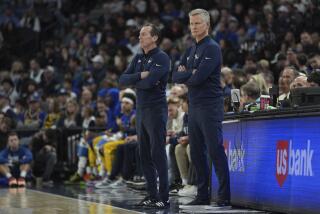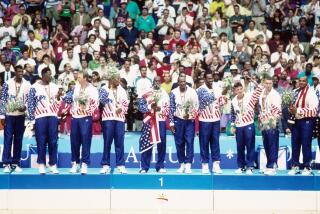Treating sport as a model for business is no slam dunk
When basketball legend Michael Jordan scored 20 straight points for the Chicago Bulls, he is reported to have been told by one of his coaches, âThere is no âIâ in team.â Jordan replied coolly, âThere is an âIâ in win.â
When Jordan uttered those words, he took on one of the sacred cows of team sport: that to succeed, the role of the individual must be subordinate to the needs of the group.
Jordanâs example suggests the exact opposite. However good his teammates were â and with a roster that included Scottie Pippen, Steve Kerr and Toni Kukoc, they were very good â his performance was so impressive that teamwork wasnât key to success.
Can such logic be applied to the business arena? Author Mark de Rond, an associate professor of strategy and organization at Judge Business School at Britainâs University of Cambridge, tries to answer the question in his intriguing new book. âThere is an I in Team: What Elite Athletes and Coaches Really Know About High Performanceâ is published by Harvard Business Review Press.
It is a timely line of inquiry. The alpha-male executives who still dominate most boardrooms are forever bringing their sporting obsessions into their approach to work. How often are Monday mornings dominated by talk of the previous weekendâs football or baseball scores and motivational talks pitched around sporting metaphors?
The temptation to use sport as a model for business is strong. De Rond writes that offices are so littered with the need to send in the âheavy hittersâ to âstep up to the plateâ when the âgoal posts have movedâ that the sporting metaphor has become a âconspicuous feature of the management vernacular.â
At the same time, the current vogue in much management thinking is the precise opposite of the winner-take-all attitude displayed by Jordan and other elite athletes.
In place of competition, the new buzzwords are those other âCâ words: collaboration, co-creation, crowdsourcing, co-working and so on. The future winners, according to this argument, will be those most able to work harmoniously with peers rather than constantly trying to outdo or outmaneuver them.
This, suggests De Rond, is problematic because too often businesses see team harmony as an end in itself. Instead, a settled and happy team is the result of success rather than its cause. âWhen teams work well, it is because, and not in spite, of individual differences,â he writes.
This oversight means the way in which managers approach competitive, high performers can be misguided. Rather than nurturing individuals, a desire to keep everyone on the team happy means that qualities such as likability and trust come to be prized more highly than skill. The result is that winning often becomes secondary to avoiding conflict.
De Rond wants to turn this on its head. âWhat feels dysfunctional need not be,â he writes, and leaders should see disharmony as a tool to drive performance. This is where the best sports managers, such as Sir Alex Ferguson of Manchester United or Bill Walsh of the NFLâs San Francisco 49ers, have excelled.
Not only have they had to manage multiple egos, they also have had to constantly rejuvenate their squads by replacing players with whom they often have had strong relationships.
Can a similar logic apply to business? De Rond goes some way in that direction, but it is hard to make the parallel stick.
For one thing, in most sports the ability of a star performer to influence a result is far more pronounced. Lionel Messi of Barcelona can win a game single-handedly; a superstar middle manager in a big organization cannot.
But perhaps the best example is Jordan. Since he retired (for the second time) as a player in 2003, he has tried to reinvent himself as a basketball executive, first as director of basketball operations with the Washington Wizards and more recently as owner of the Charlotte Bobcats. He was fired from his position at the Wizards, and last season the Bobcats finished dead last.
Reviewer Ravi Mattu is an editor at the Financial Times of London, in which this review first appeared.
More to Read
Inside the business of entertainment
The Wide Shot brings you news, analysis and insights on everything from streaming wars to production â and what it all means for the future.
You may occasionally receive promotional content from the Los Angeles Times.







